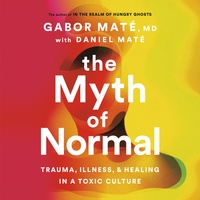Take a photo of a barcode or cover
Correlation does not equal causation, and it is frustrating how many times the author seems to ignore that fact.
challenging
reflective
medium-paced
Informative but I disliked the narrator.
Delighted and disappointed in equal measure here - Maté's central claim is, of course, a hugely relevant, even urgent one: we need to radically re-envision how our culture works to promote well-being and connection over atomization and destructive capitalistic individualism. We also need to see healing as a more holistic process, involving mind, body, and society (in his awkward terminology, this gets various labels). Entirely agree with this much, and its importance.
If the book stuck to these central ideas, with some illustrative examples (of which there are plenty), it would be an excellent work. However, he ventures well outside of his areas of expertise, and offers up over-simplistic analyses of issues well beyond his forte. These, as with some of the potentially dangerous medical claims in the text, often rely on a few cherry-picked studies and observations, mixed in with quotes from other pop-science and pop-psychology authors, whom Maté insists on calling 'my friend and colleague' ad nauseam (as if his credentials aren't well enough established to obviate name-dropping on such a scale...).
If the book stuck to these central ideas, with some illustrative examples (of which there are plenty), it would be an excellent work. However, he ventures well outside of his areas of expertise, and offers up over-simplistic analyses of issues well beyond his forte. These, as with some of the potentially dangerous medical claims in the text, often rely on a few cherry-picked studies and observations, mixed in with quotes from other pop-science and pop-psychology authors, whom Maté insists on calling 'my friend and colleague' ad nauseam (as if his credentials aren't well enough established to obviate name-dropping on such a scale...).
challenging
emotional
hopeful
informative
inspiring
sad
medium-paced
This is by far my favorite book I’ve read this year and I believe it’s one of the most important books to share with others. It exposes the toxic nature of modern western culture and how it relates to the increasing levels of disease and disorder in wealthy countries like the US and Canada. Dr. Gabor Mate backs his reflections with research but also integrates wisdom from indigenous cultures and societies without appropriating or repackaging them. He takes an incredibly balanced perspective grounded in the desire to help others understand how the mind and body are intimately connected without the ego or inflated narratives common in other books on this topic. The book is incredibly comprehensive and covers many avenues of individual and collective pain, and ends with hopeful stories and commentary on how to improve our world. The first step is a collective awareness of how abnormal our definition of “normal” has become in the first place. Please read this book and share it with everyone you know. I believe it has the power to do a lot of good.
challenging
emotional
informative
reflective
medium-paced
hopeful
informative
inspiring
medium-paced
dark
hopeful
informative
inspiring
medium-paced
How things really are
Familiar ground
A bit repetitive
Light on solutions
Familiar ground
A bit repetitive
Light on solutions
informative
inspiring
reflective
medium-paced
This has been the longest audiobook I've listened to this year so far. 18 hours of an array of various examples and topics and anecdotes Gabor Mate writes about in his pursuit of dispelling the myth of normal. It all just blended in together for me and it was tough to follow at times when the author would jump from one subject to another.
I think the gist of this book ponders on the idea that we're all damaged in some way or form. We all have qualities that might be deemed "defective," but such qualities are not signs of us being inferior or less than, but rather that we are as human as can be.
Mate does make a bold controversial statement that some of the trauma that we have stems from childhood and while it is an interesting theory, I don't know if it can hold water in the general sense. It's interesting listening to him explain that, though.
Listening to "The Myth of Normal" was decent enough. I'll probably forget most of it since I listened to it while doing other things. But I hope to revisit this book in print form.
I think the gist of this book ponders on the idea that we're all damaged in some way or form. We all have qualities that might be deemed "defective," but such qualities are not signs of us being inferior or less than, but rather that we are as human as can be.
Mate does make a bold controversial statement that some of the trauma that we have stems from childhood and while it is an interesting theory, I don't know if it can hold water in the general sense. It's interesting listening to him explain that, though.
Listening to "The Myth of Normal" was decent enough. I'll probably forget most of it since I listened to it while doing other things. But I hope to revisit this book in print form.
challenging
informative
inspiring
reflective
medium-paced





